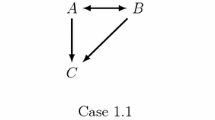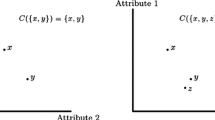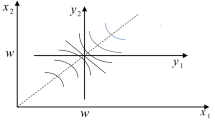Abstract
The present model of individual decision is based on the assumption according to whichthe agent's preferences over sets of alternatives are stochastic in a multiself sense and leadto choice probabilities describing past decisions. Then, using this recorded information inan optimal way, it is first shown to imply some auto-experiment which modifies the termsof the current choice. Actually, the relative desirability of alternatives in competition issupposed to be learnt by the agent step by step. Hence, competition among alternatives canhere be formalized in terms of contests which may involve alternatives and/or bundles ofalternatives, and in which only chosen bundles (decisions) are observed. The specific natureof desirability is left unspecified, and is treated simply as an abstract measure which isincreased monotonically for decisions and left unaltered for all others. Under the keyassumption that the intensification of chosen alternatives' desirability increases with thedesirability of the unchosen bundles, the main result is to establish the existence of certainbiased competitions which are uniformly informative in the sense that the agent's confidence(subjective probability) about the best alternative is increased regardless of the decision ofthe competition (where no competition is allowed to end in a draw). In addition, it is shownthat when there is a highly frequent alternative (called a hard alternative) with sufficientlystrong desirability relative to all other alternatives, there exists no biased competition favoringless frequent alternatives which are uniformly informative.
Similar content being viewed by others
References
S.P. Anderson, A. De Palma and J.F. Thisse, Discrete Choice Theory of Product Differentiation, MIT Press, Cambridge, MA, 1992.
M. Arai, A. Billot and J. Lanfranchi, Efficient selection of agents under limited ability to rank: Biased contests and favoritism, Working Paper, ERMES, Université Panthéon-Assas, Paris, 1995.
A. Billot and T.E. Smith, Informative contests and the efficient selection of agents, in: Knowledge and Networks in a Dynamical Economy, Essays in honor of Ake Andersson, ed. M.J. Beckmann, Springer, New York/Heidelberg, 1998.
A. Billot and J.F. Thisse, A nonadditive probability of individual choice, Working Paper 9401, CORE, Université Catholique de Louvain, Louvain-La-Neuve, 1996.
A. Billot and J.F. Thisse, Modèles de choix individuels discrets, Revue Economique 46(1995)921–932.
A. Billot and J.F. Thisse, A discrete choice model when context matters, Working Paper, CERAS, Ecole Nationale des Ponts et Chaussées, Paris, 1997.
H.D. Block and J. Marschak, Random orderings and stochastic theories of response, in: Contributions to Probability and Statistics, ed. I. Olkin, Stanford University Press, Stanford, 1960.
C.F. Camerer, Individual decision making, in: Handbook of Experimental Economics, eds. J.H. Kagel and A.E. Roth, Princeton University Press, Princeton, NJ, 1994.
H.C. Chen, J.W. Friedman and J.F. Thisse, Boundedly rational Nash equilibrium: A probabilistic choice approach, Games and Economic Behavior 18(1997)32 – 54.
J.E. Elster (ed.), The Multiple Self, Cambridge University Press, Cambridge, 1986.
J.C. Falmagne, Elements of Psychophysical Theory, Oxford University Press, Oxford, 1985.
I. Gilboa and D. Schmeidler, Case-based decision theory, Quarterly Journal of Economics 90(1995) 605 – 640.
R.D. Luce, Individual Choice Behavior: A Theoretical Analysis, Wiley, New York, 1959.
R.D. Luce, The choice axiom after twenty years, Journal of Mathematical Psychology 15(1977) 215 – 233.
R.D. Luce and P. Suppes, Preference, utility, and subjective probability, in: Handbook of Mathematical Psychology, vol. 3, eds. R.D. Luce, R.R. Bush and E. Galanter, Wiley, New York, 1965.
C. Manski, The structure of random utility models, Theory and Decision 8(1977)229 – 254.
D. McFadden, Conditional logit analysis of qualitative choice behavior, in: Frontiers in Econometrics, ed. P. Zaremka, Academic Press, New York, 1974.
M. Meyer, Learning from coarse information: Biased contests and carrier profiles, Review of Economic Studies 58(1991)15– 41.
L.L. Thurstone, A law of comparative judgement, Psychological Review 34(1927)273 –286.
A. Tversky, Choice by elimination, Journal of Mathematical Psychology 9(1972)341 – 367.
Rights and permissions
About this article
Cite this article
Billot, A. Autobiased choice theory. Annals of Operations Research 80, 85–103 (1998). https://doi.org/10.1023/A:1018936503162
Issue Date:
DOI: https://doi.org/10.1023/A:1018936503162




